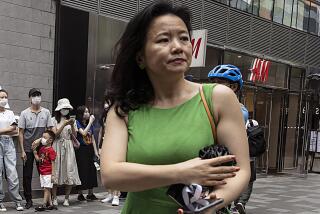Taiwan Reporters End Trip to China, Face Jail
- Share via
BEIJING — Two Taiwanese journalists completed an unprecedented 13-day reporting trip through China on Sunday and returned to Taiwan, where the government announced they face possible imprisonment.
Li Yung-teh, 33, and Hsu Lu, 30, reporters for the Independence Evening Post, made their journey in defiance of a 38-year-old ban imposed by Taiwan’s government on travel to mainland China.
The newspaper sent them, however, because authorities are expected to relax the ban soon.
One proposal that has been under consideration is to allow mainland visits by anyone except military personnel and government employees. Another proposal would limit visits to those over 55 years of age who have relatives on the mainland.
About 2 million people fled to Taiwan in 1949 when the Nationalist government took refuge there after the Communist victory on the Chinese mainland. Many still have families on the mainland.
10,000 Visitors a Year
In recent years, China has welcomed a flow of visitors from Taiwan estimated at about 10,000 people a year. Most keep their trips secret from all but their closest friends and relatives, but even when Taiwan authorities have learned of visits, punishment has generally been limited to a two-year suspension of the right to travel abroad.
Taiwan’s government information office charged Sunday, however, that the two reporters and the paper’s editor, Wu Feng-shan, had committed criminal offenses by filing false applications for overseas news reporting only in Japan.
The government announced that the three journalists will face criminal charges in Taipei District Court punishable by up to three years in prison, according to wire service reports from Taipei.
The trip by Li and Hsu has been viewed as an important step toward greater contacts between the Nationalist-ruled island and the Communist-ruled mainland.
China gave a low-key but friendly welcome to the reporters. Li and Hsu were guests of the official New China News Agency, but in interviews with correspondents in Beijing, they stressed that they were paying their own way.
China used the reporters’ visit to stress the theme of national reunification.
Their visit reflects “the people’s desire for promoting the nation’s communication,” the news agency reported in mid-September.
The New China News Agency reported that in the expectation that Taiwan will permit mainland visits, “relevant government offices and local authorities are stepping up preparation to receive . . . more Taiwan compatriots coming back to visit their relatives or to travel.”
In their dispatches from China, Li and Hsu seemed struck by China’s poverty compared to Taiwan and by a sense of great differences despite the shared heritage of race, language and culture.
They described Beijing as “a strange and distant city.”
“Along the streets, we saw many simple stalls like those you only see in the most remote villages of Taiwan,” they wrote. “The stall-keepers were selling the oldest style of commodities and clothes.”
Even in Beijing’s biggest department store, they wrote, “the low standards were way beyond our expectations.”
Hsu reported that she bought a bright yellow jacket in one of Beijing’s night markets and was later surprised to discover that it was made in Taiwan.
In a press conference before leaving Beijing, Li criticized the uniformity of views expressed by the Chinese they had interviewed.
“Almost everyone I have met in China has given the same opinion on any topic,” he said. “That’s why I don’t like socialism.”
The two reporters were allowed to conduct an interview with Fang Lizhi, an astrophysicist who is one of China’s most famous advocates of greater democracy. Fang was stripped of his Communist Party membership earlier this year in the wake of pro-democracy student demonstrations that he was accused of helping inspire.
Li and Hsu also interviewed several defectors from Taiwan or others who have chosen to live in China.
In Hong Kong on Sunday, Li and Hsu said they were prepared to face some punishment for their trip. But Li said he expected it to be no more severe than a period of denial of permission to go abroad.
More to Read
Sign up for Essential California
The most important California stories and recommendations in your inbox every morning.
You may occasionally receive promotional content from the Los Angeles Times.













